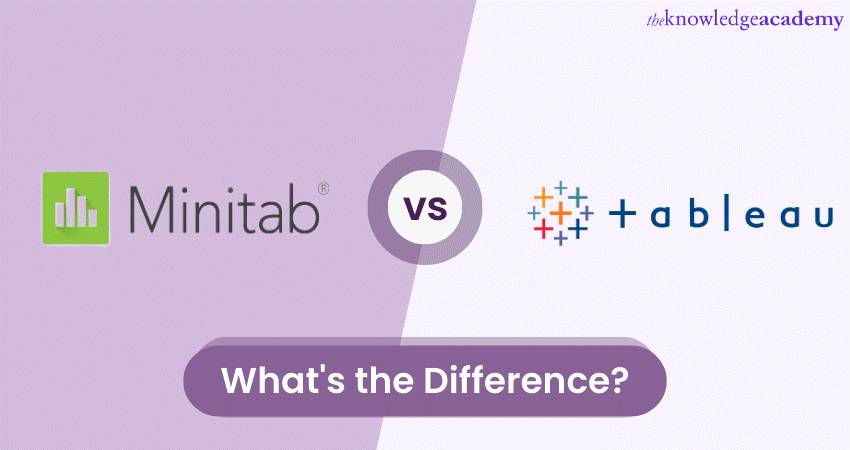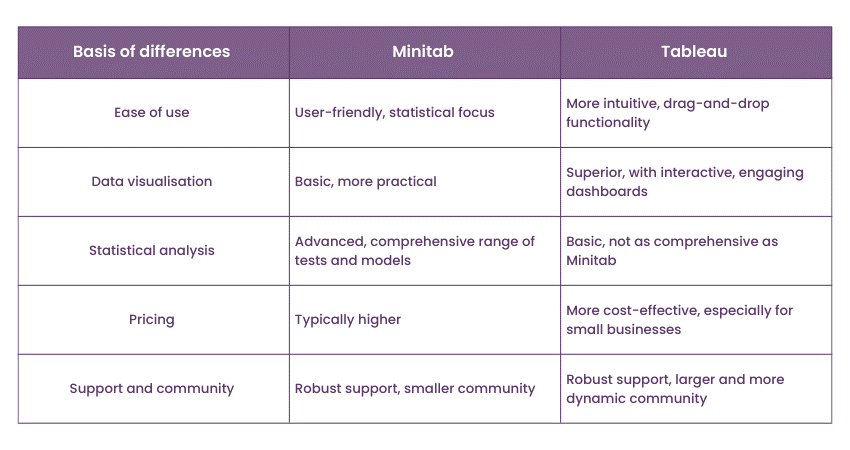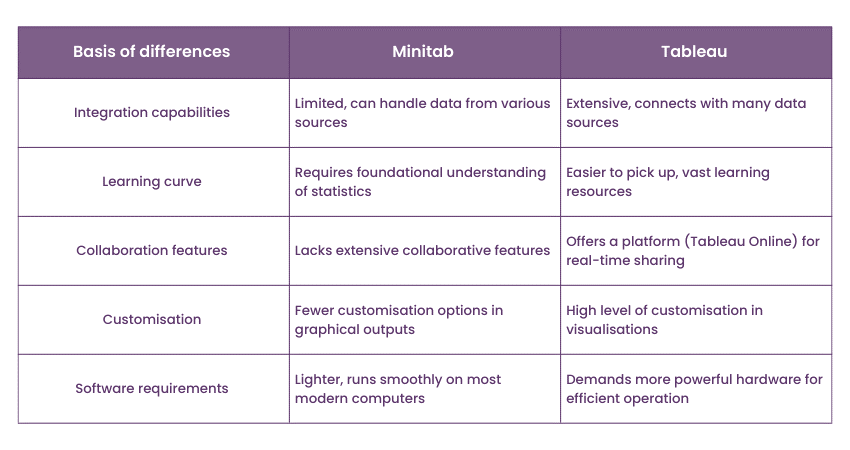We may not have the course you’re looking for. If you enquire or give us a call on +34 932716793 and speak to our training experts, we may still be able to help with your training requirements.
We ensure quality, budget-alignment, and timely delivery by our expert instructors.

Data analysis tools have become fundamental in the modern business landscape. Among the plethora of available tools, competition exists between Minitab vs Tableau as two giants that often stand out. But what separates these two powerhouses?
According to EnLyft, Tableau has a share of 16.23% in the category of Business Intelligence, with more than 45,000 enterprises using this data analysis tool. How does Minitab compare with Tableau?
Find out more as you read this blog about Minitab vs Tableau, the two main competitors in the Business Intelligence industry.
Table of Contents
1) What is Minitab?
2) What is Tableau?
3) A detailed comparison of Minitab vs Tableau
4) Conclusion
What is Minitab?
Minitab is a robust statistical software suite widely embraced in the realm of Six Sigma methodology and other data-driven practices. Renowned for its simplicity and reliability, Minitab provides a range of powerful statistical tools for businesses, facilitating data-driven decision-making. It offers an array of features from basic descriptive statistics and graphical analysis to advanced hypothesis testing and regression. Moreover, Minitab's predictive analytics capabilities make it a potent tool for forecasting future trends, ensuring businesses stay ahead of the curve in a market with a lot of competition.

What is Tableau?
Tableau is a leading data visualisation tool that empowers users to interact with their data in an intuitive and dynamic manner. Known for its user-friendly interface, Tableau allows users to create compelling reports and share insights in a visually engaging format. It simplifies the process of turning complex data into easy-to-understand, interactive dashboards and visual stories. With a strong and vibrant community of users, Tableau also provides a wealth of resources for learning and improvement, making it a favourite amongst data scientists, analysts, and business professionals.
A detailed comparison of Minitab vs Tableau
When it comes to Minitab vs Tableau, several factors come into play, highlighting their respective strengths and capabilities. Listed below are the differences between both the Business Intelligence powerhouses:

1) Ease of Use
Both Minitab and Tableau pride themselves on user-friendly interfaces. However, Tableau offers a slight edge with its drag-and-drop functionality, making it more intuitive, especially for those new to data analysis.
2) Data visualisation
In the realm of data visualisation, Tableau is undoubtedly the winner. It excels at transforming complex data into engaging, interactive dashboards, overshadowing Minitab's more practical but less visually appealing displays.
3) Statistical analysis
When we shift our focus to statistical analysis, Minitab is the frontrunner. It provides an extensive range of statistical tests and predictive modelling tools that surpass what Tableau can offer in this domain.
4) Pricing
In terms of cost, Tableau typically offers a more economical solution compared to Minitab, making it a preferred choice for smaller businesses or individuals operating on a tight budget.
5) Support and community
Both Minitab and Tableau offer robust support systems and vibrant, active communities. However, Tableau's community is more extensive, offering a more comprehensive range of resources and peer-to-peer assistance.
Unlock the power of data visualisation, gain proficiency in Tableau, and become a skilled business intelligence professional with our Tableau Desktop Training!

6) Integration capabilities
Tableau stands out with its impressive integration capabilities. It allows users to connect with a multitude of data sources, from Excel spreadsheets to SQL databases and even cloud services, providing a seamless data analytics experience. Minitab, while it can handle data from various sources, lacks the extensive integration capabilities of Tableau.
7) Learning curve
While both tools are user-friendly, they each present a different learning curve. Minitab, with its focus on statistical analysis, requires a foundational understanding of statistics. While also needing a base knowledge in data analysis, Tableau is often considered easier to pick up, especially with its vast learning resources.
8) Collaboration features
In the realm of collaboration, Tableau again takes the lead. It offers a platform called Tableau Online, where users can share their findings, dashboards, and visualisations with their teams in real-time. Minitab, while offering reliable analysis, lacks such extensive collaborative features.
9) Customisation
Tableau provides a high level of customisation with its visualisations, letting users tweak virtually every aspect of their charts and graphs. Minitab's focus on statistical accuracy means it offers fewer customisation options in its graphical outputs.
10) Software requirements
Minitab is lighter in terms of system requirements and can run smoothly on most modern computers. Conversely, Tableau demands more powerful hardware to operate efficiently, especially when handling large datasets.
Unlock the power of statistical analysis, gain expertise in Minitab software, and become a skilled business intelligence professional with our Minitab Training!
Conclusion
When it comes to Minitab vs Tableau, the decision boils down to your specific needs. Minitab is the ideal choice for statistical analysis, while Tableau shines in data visualisation. Both offer unique strengths and understanding their differences will help you make an informed decision. It's not always about choosing the better tool but rather the right tool for your needs.
Unleash business intelligence, gain insights, elevate your career with Business Intelligence Reporting. Register now!
Frequently Asked Questions
Upcoming Office Applications Resources Batches & Dates
Date
 Microsoft Power BI Course
Microsoft Power BI Course
Wed 15th Jan 2025
Wed 5th Feb 2025
Wed 9th Apr 2025
Wed 11th Jun 2025
Wed 6th Aug 2025
Wed 8th Oct 2025
Wed 3rd Dec 2025







 Top Rated Course
Top Rated Course


 If you wish to make any changes to your course, please
If you wish to make any changes to your course, please


